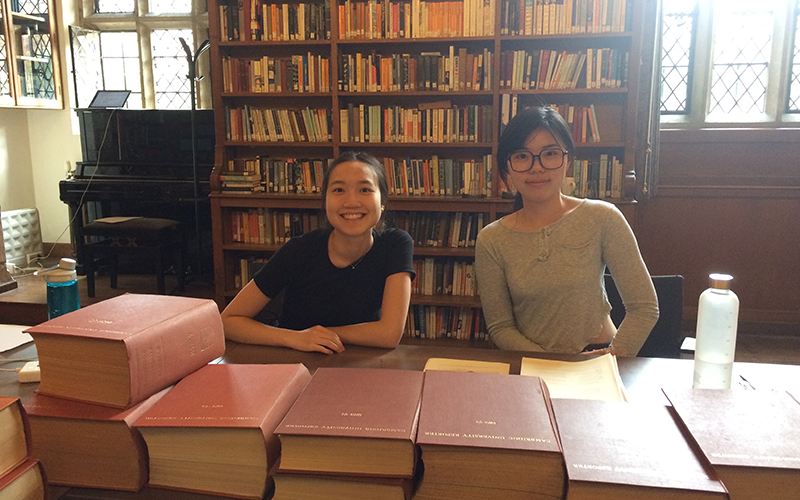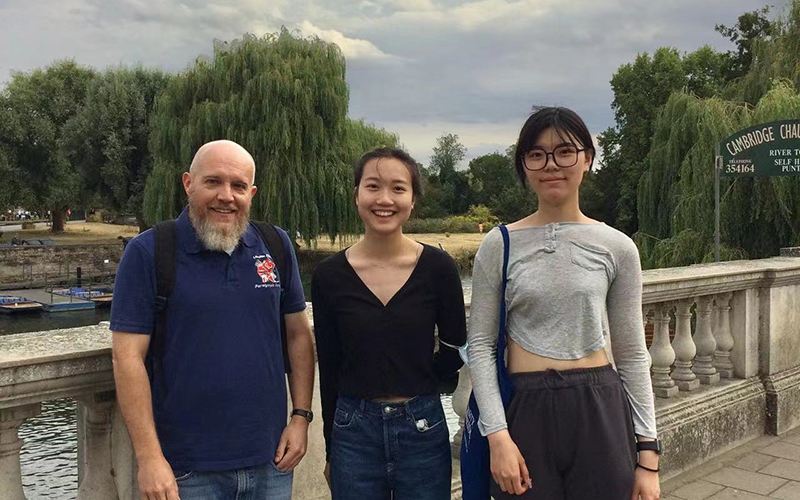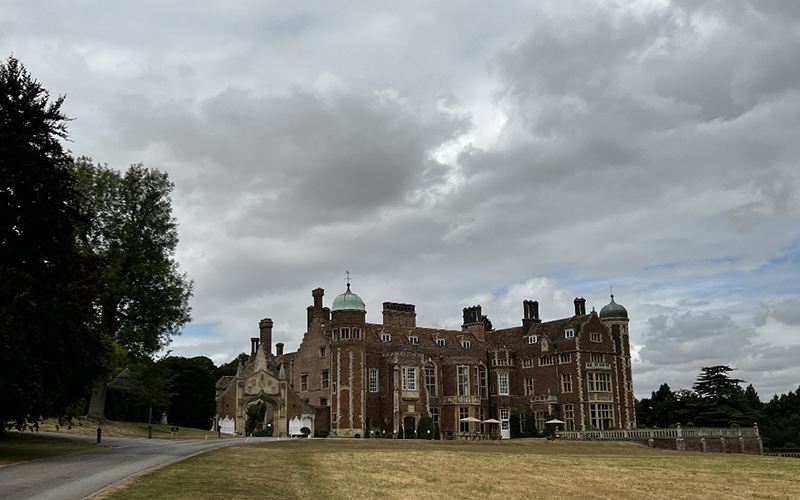Make the most out of UCL: My EPSURF fellowship experience
By IOE Blog Editor, on 15 May 2023
By Jianuo Vivian Yang and Yuvin Lawela Kim, Education Studies BA*
*From the 2024/2025 academic year onwards, the Education Studies BA has been renamed the Education, Society and Culture BA.
The Education, Practice and Society Undergraduate Research Fellowship (EPSURF) is a research opportunity for undergraduate students in the Department of Education, Practice and Society at IOE, UCL’s Faculty of Education and Society. It gives students the chance to collaborate with a member of academic staff on an ongoing research project that interests them.
Meet Vivian Yang, a final year Education Studies BA student
The project that I worked on was Professor Mark Freeman’s ongoing research on the history of the University of Cambridge Institution of Continuing Education (ICE). The project started in April and finished in July, and I worked together with Alice Wang from my cohort.

A photo of Vivian and her colleague, Alice in the archives. Image credit: Mark Freeman.
I think EPSURF is one of the best opportunities to acquire and improve your research and transferable skills while still having fun. The project involved researching continuing education, higher education, extra-mural studies and the institution’s history using a combination of theoretical, historical and empirical approaches.
While undertaking desk research, I read some academic journals, institutional history literature and some book chapter drafts written by Professor Freeman. Alice and I were also given some interview recordings to compile interview transcripts. It was a very interesting and thought-provoking task: you get to listen to stories that describe very different classrooms to what we have today.
I remember hearing about a geology teacher who saved rare rocks from a construction site on campus and used them as teaching material, and another who used to drag heavy glass slides into the classroom to teach. I realised I never thought about how people used to obtain educational resources to teach before the invention of the internet and the technologies we use today.

Group photo of Vivian, Alice and Professor Mark Freeman. Image permission: Jianuo Vivian Yang.
I was also surprised and intrigued when I was able to link what I learnt on the Education BA programme with some of the interview content, such as how higher education institutions played a role in the education landscape back then or how accreditation influences teaching.
I also learned some completely new things, such as what made people promote or devalue extra-mural lessons, etc. Furthermore, I was not just able to improve my transcribing skills; I also learnt about the other aspects of conducting empirical research, such as how to store data securely as part of the ethical considerations.
One of the highlights of my EPSURF experience was the trip to ICE in late July. The trip gave me an immersive research experience. Our main task was to do some archival research. We were given access to the archive and were allowed to read the Institute’s annual reports. It was interesting to see the importance of extra-mural classes reflected in the length of the section dedicated to it and how this changed in annual reports across time.
We stayed for one night, so there was plenty of time to explore the Institute, live the campus life a little, and get to know nearby areas and the local life there. When walking around ICE, it was particularly exciting to recognize names on the portraits and paintings on the walls and make links between these faces and the stories from the interviews. It felt like history had come alive.

The University of Cambridge Institution of Continuing Education (ICE). Image credit: Jianuo Vivian Yang.
EPSURF was a very valuable experience. I found myself having different roles: I was a thinker, researcher, communicator, and learner. It challenged me to take initiative, use what I learnt on my BA course, be responsible and collaborative and develop in different facets. While there are also plenty of other research opportunities at UCL, such as the Laidlaw Scholarship (only available to year one students), or the third-year dissertation module (for students to conduct their own library based or empirical research), I would highly recommend EPSURF because I think it provides different features when compared to the other opportunities.
Meet Yuvin Kim, a second-year student in the Education Studies BA
In the summer of 2022, I had the privilege of participating in the EPSURF programme, where I conducted research on climate change and youth activism in South Africa.
Through my participation in the EPSURF, I had the invaluable opportunity to design and conduct my own research project. This involved taking the necessary ethical steps, such as obtaining informed consent and ensuring confidentiality, as well as conducting thorough preliminary research before conducting interviews. Once I had collected and organised the data, I then had to carefully consider the most effective ways to re-communicate my findings to the public, drawing from both my interviews and relevant research journals. Overall, this experience not only taught me important research skills, but also helped me gain a deeper understanding of the complex issues surrounding climate change and social justice and gave me the opportunity to reflect on myself.
Through my interviews, it became apparent that conveying the urgency of climate change could be challenging if it was too detached from the realities of people’s lives. During my interviews, I encountered an interviewee who described the climate change movement and policy implementation as the “hobby of the rich.” This was because the discussions and actions taking place were so detached from the reality and knowledge of the people affected by climate change. It became clear that climate change was not just about weather, famine, and other ecological issues, but also about the structural inequality that affected different communities in various ways. In my community, issues such as access to clean water, food, safety, HIV/AIDS, rape and electricity were more pressing concerns than talking about climate change.
Moreover, people in disadvantaged communities were the ones bearing the brunt of the effects of climate change. These communities were on the forefront of suffering the consequences of climate change, while often having limited access to resources to mitigate its impact. For example, farm workers had to deal with rising food prices while work was limited, and pay was reduced due to droughts. The issues of climate change and social justice were intertwined, and it was essential to address both simultaneously to create a more equitable and sustainable future.
To my surprise, I found myself in the midst of doctors and professors from all around Africa, studying climate change at the African Regional Forum on Climate Change. I was the only undergraduate student in attendance, which was both intimidating and inspiring. Being included in the discourse with people who were dedicated to climate change and social justice was an incredible opportunity. Asking questions during panel discussions and hearing about the situation from an African perspective was especially refreshing.
The EPSURF programme opened doors for me that I would never have been able to enter on my own. I was included in a community of people who were dedicated to climate justice and activism, and I found a gap in the discourse surrounding climate change: information is often difficult to disseminate to the public when it comes from research journals.
Going forward, I hope to contribute to the discourse of climate justice and educate young people to support youth activism. The EPSURF programme has inspired me to pursue further research in this field and has given me the tools to make a positive impact on the world. Many thanks to Mark, Georgina and Stuart who made my first steps so positive.
 Close
Close


